Does your house make more than you?
- Published
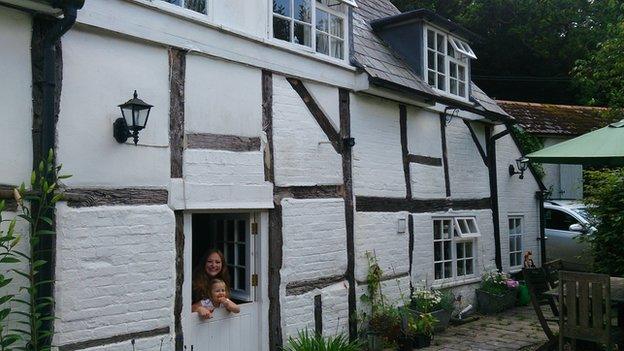
Living the good life, Rebecca Fletcher and her family swapped London living for a countryside abode
With house prices growing faster than incomes in many parts of the UK, is your house making more money than you do? Find out by using the calculator below.
Thanks to an extra breadwinner in the family, Rebecca Fletcher, her husband and two daughters are living the good life in a rural cottage deep in the Hampshire countryside.
The extra breadwinner is their old family home - a three-bedroom, terraced house in south-west London which Mrs Fletcher, a primary school teacher, and her husband, a London solicitor, bought in 2007.
They paid £450,000 - right at the top of the house price boom of the last decade.
When house prices fell after the 2008 banking bust, they feared financial disaster.
"We thought, 'Are we ever going to be able to move out of this house - are we ever going to recoup the money we've spent on it?'" says Mrs Fletcher.
Their fears proved unfounded.
In 2009, prices in south-west London started rising, and went on rising. By the time they sold their former home last August, the price was £655,000.
According to calculations done for the BBC by Lloyds Bank, in the 12 months before the sale, Mrs Fletcher's London home had increased in price by about £100,000 - more than her and her husband's earnings put together.

How much has your house made?
Enter your details into the calculator to find out:

"We were staggered," says Mrs Fletcher. "It meant that we could look for a house in Hampshire that was worth a little bit more. And I was able to give up teaching as a full-time job and start a new career as a freelance writer."
Lloyds Bank says in the year before Mrs Fletcher and her family sold up in London, prices in the part of Hampshire to which they moved had remained largely the same.
As a result, the £100,000 rise in the price of Mrs Fletcher's former London house was a direct bonus to the family finances, easily covering additional expenses such as higher commuting costs for her husband.
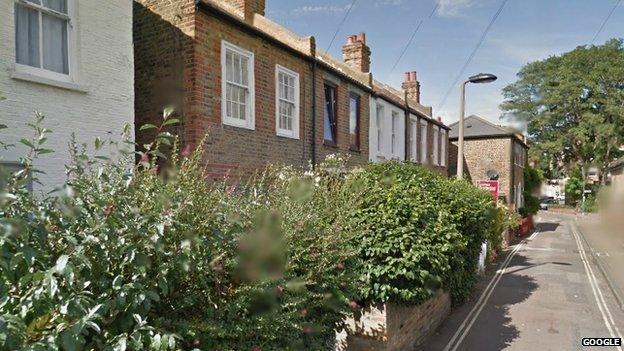
Mrs Fletcher was "staggered" at how much her former home sold for on this quiet road in south-west London
Relentless rises
While the seemingly relentless price rises have been a boon for property owners like Mrs Fletcher and her family, to people struggling to get a first foot on the housing ladder they are proving to be a nightmare.
For Danny Gabay, a director of the economic consultancy Fathom, the present level of prices is a sure sign that the housing market is in a bubble.
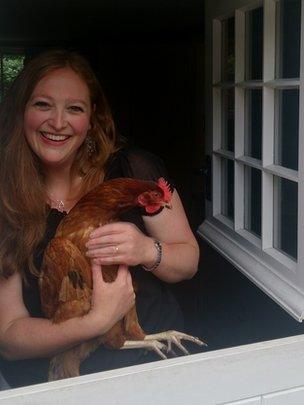
Mrs Fletcher is enjoying the countryside lifestyle and has started a new career as a freelance writer
"I'm certain we're in a bubble," says Mr Gabay. "We were already in a bubble. We never left the bubble."
Between 1995 and 2007, when average UK house prices more than trebled, Mr Gabay repeatedly warned prices were too high.
After the 2008 banking crisis prices fell as the housing bubble began naturally to deflate. But then, Mr Gabay says, rock bottom interest rates and schemes to encourage banks to keep lending such as Help to Buy halted that process.
"These policies all helped to buoy house prices and keep them in suspended animation," says Mr Gabay, "which meant that our housing market remains exceptionally expensive."
Compared to average earnings, Mr Gabay says prices are now 30% higher than they should be.
There is no question that house prices have grown far faster than incomes. According to the Nationwide Building Society, at the peak of the 1980s house price boom, an average UK first time buyer's house cost under four times UK average earnings.
Today, even after the banking bust, the average first time buyer's house costs nearly five times UK average earnings.
But Prof Steve Wilcox, a specialist in housing finance, says price/income ratios are not the whole story, because the interest rate environment has also changed.
"In 1990 interest rates were around 10, 12 or 15%," says Prof Wilcox. "They're now around 3 or 4%, and although we're likely to see some increase in interest rates in the next year or two, it's about getting back from somewhere like 3-4% towards 5-6%.
"We're not - unless there is something completely unexpected - going to see any kind of return to the 12-15% we saw in 1990."
When you take account of lower interest rates, Prof Wilcox calculates, average mortgage costs as a proportion of average incomes are now lower than they were at the height of the boom in 2007 and far lower than they were in 1990.
No 'average' market
Across the country, the Nationwide Building Society says average house prices are now slightly higher than they were at the peak of the boom in 2007.
But in the UK there is no such thing as the "average" housing market.
Average prices in London are now 32% higher than they were in 2007, while in Oldham, in the north-west of England, houses still cost 12% less than than they did at the peak of the boom.
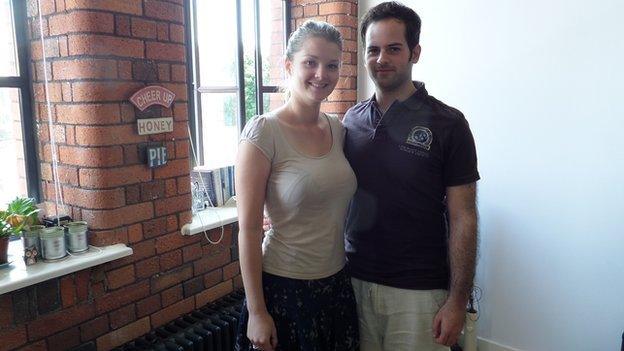
Kirsty Kelly and her partner Richard bought their house in Bristol after seeing it only once
Oldham estate agent Alan Kirkham says there is no sign of a house price bubble in his part of the world, where price reductions are common and properties can take many months or even years to sell.
"A terraced house in this area was around the £100,000 mark at the peak of the market and really it hasn't quite got back to that," says Mr Kirkham.
"I would say we're probably halfway back to where we were, but your average price for a terraced house now in reasonable condition is probably about £80,000-£90,000, still down from the peak."
Elsewhere, the picture is very different. Bubbles happen when people buy because they believe prices will go on rising rather than because they think the price they are paying is correct, and that belief can create a self-perpetuating frenzy of demand.
'Creating a bubble'
In Bristol, buyers now routinely share property viewings with a crowd of other house-hunters, all competing to get onto the housing ladder.
After months of being outbid, Kirsty Kelly and her partner Richard finally managed to buy their first house after seeing it once for just a few minutes in a shared viewing after offering above the asking price.
The price they paid is a third higher than their new house was last sold for just three years ago.
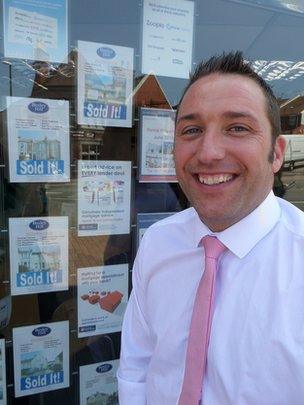
Estate agent Paul Fearon says homes are being snapped up quickly in Bristol
Ms Kelly says even the property professionals like the estate agents and valuers she is dealing with do not seem sure whether Bristol prices are now too high.
"This word 'bubble' does seem a bit crazy and it's kind of scaremongering from my opinion, but there is a frenzy, and I think people are making quite rash decisions," says Ms Kelly.
Bristol estate agent Paul Fearon says homes are being bought within 24 to 48 hours of being put on the market. When we called by, every property in his window had a Sold It! sticker on.
"Our window's been like this since Christmas," says Mr Fearon. "Nearly everything's selling at the moment and the prices on the properties have gone up a huge amount in relation to values 12 months ago."
Mr Fearon has been an estate agent in Bristol since 1997. Even at the height of the last boom, he says, he never saw anything like the present level of demand.
"I think they are creating a bubble," he says.
"I think maybe in a year, 18 months time you may find there may be a big crash."
A crash in property prices is something politicians and policymakers are desperate to avoid. But so too is a housing bubble.
In July, the governor of the Bank of England, Mark Carney told MPs that a housing bubble now poses the biggest threat to the UK's economic recovery, because higher prices will increase the amount of mortgage debt UK households have to bear.
"If enough people are highly indebted, that has a big macro-economic impact. It can tilt the economy back into recession," he said.
And with total UK household debt still 40% higher than total annual household incomes, Mr Carney told MPs: "We start from a position of vulnerability."
Policymakers are hoping their new tougher tests on the affordability of mortgages and the prospect of higher interest rates will cool the present frenzy - the latest figures from Nationwide, external suggest the rate of growth is slowing.
The potential cost of not doing so is high - higher total mortgage debt, greater numbers of families shut out from home ownership and the widespread economic damage a crash in prices would cause.
Bricks and Bubbles starts on Saturday, 2 August at 12:00 BST on BBC Radio 4 or catch up later on BBC iPlayer.